Text
March roundup - Russian
And as promised in my last post, here's my Russian roundup of March!
(Anki) Russian starter deck (this one)
By now, I reviewed every card at least once! This deck is a good start. Each card presents a sentence which changes every day (so that you learn the words and not memorize the sentence). If you click on a word, you can check its definition. Plus, some cards contain grammar explanations. However, I noticed that some sentences are confusing. Sometimes because of the lack of context and sometimes because they contain difficult phrases. Even after checking the individual words and the translation of some phrases, it didn’t make sense to me. In cases like this all you can do is to memorize what this combination of words means. Anyways, I'll continue reviewing this deck.
(Anki) ru15k (this one)
I suspended all cards except for the first 1k cards to focus on them first. I'm currently reviewing 10 new cards per day. Maybe a bit low, but my main focus is reading. That's why I try to keep my daily Anki time below 30 minutes. To me, this deck is only a supplement.
(YouTube) Comprehensible Russian: Zero Beginner
I watched almost all videos from this playlist! I skipped a few videos because sometimes the audio quality is not good or the video was originally a private lesson where you hear the learner in the background (they sometimes talk in English in these videos). Sometimes she uses words I don't know yet but, overall, I can understand these videos well.
(YouTube) Comprehensible Russian: Beginner 1
I'll stay with this YouTube channel and continue with the Beginner 1 playlist. I watched 4 videos so far. They are pretty similar to the ones from the Zero Beginner playlist but the topics are a bit more complex.
Short Stories in Russian for Beginners by Olly Richards
I finished all short stories from this book! Since I started from zero I had to look up almost every word in the beginning which was hard, but I learned a lot along the way. The stories were not as exciting like a bestseller for example but there was always an interesting plot twist. They introduce many common words and repeat them regularly in their stories, which helps to get used to them. By looking up every unknown word I noticed a few small errors in the text (e.g. sometimes a wrong letter was used so when I put this word in an online dictionary it wasn't possible to find it at first). It’s not a big deal but learners should keep that in mind and be a bit cautious. (I've read the ebook version)
Short Stories in Russian for Intermediate Learners by Olly Richards
This graded reader is aimed at intermediate learners so it’s noticeably more difficult. But it’s still easier than the novel I started which is aimed at native speakers. Like with the other graded reader before, I noticed a few small errors in the text (like a wrong letter or a additional letter for example). It's not a big problem, just be a bit cautious. (I'm reading the ebook version)
Assimil (lesson 11 - 17)
I did one lesson per day in the beginning but I noticed that I had trouble with new words. After 10 lessons, I reviewed some lessons a few more times before going on. After that I decided to listen and read every lesson (at least) twice before moving on, means I listen and read a new lesson on one day and on the next day I review this lesson once more. I move on as soon as I can understand the dialogue without checking the meaning of words.
Две встречи в Париже
This book contains two stories. The first one is Медовый месяц в Париже and I finished the first chapter! This is my personal highlight from this month. I chose this book as my first novel in Russian because it contains two rather short stories. This makes it less daunting and overwhelming. I also bought the audio book. I read around one page per day. The story is interesting so far. I'm curious how it will continue.
Reading novels is very difficult at my level of course. Compared to the graded readers the used language is more complex. So I need to look up a lot of words. It's difficult but I take my time. Reading a real novel feels great and is a strong motivation!

Fit in 30 Tagen Russisch (textbook)
I bought this textbook years ago but after a few lessons I felt overwhelmed because in every lesson they introduce many new words and phrases at once and the grammar explanations were too complicated and dry. To me, textbooks like these are not very beginner friendly. (Assimil does a much better job in my opinion.) But since I bought this book I also want to use it in some way, so now I started to read the dialogues and listen to the audio. I treat it like graded readers and not like a textbook. I only use this book as additional (level appropriate) reading material.
Euronews article
News articles are very difficult at my level but I wanted to read another one because I was very interested in the topic. I looked up lots of difficult words but I also gained interesting information.
(YouTube) In Russian From Afar - Beginner Videos A1
Originally, I wanted to start with "Russian with Max" at this point but then I came across this channel and changed my plan. I like his videos for beginners more. I'll switch to "Russian with Max" when I can understand more. The videos I watched so far have Russian subtitles. I try to understand as much as I can from the video itself but if in doubt I check the subtitles.
Animal Crossing
I also started to play Animal Crossing in Russian! I loved playing AC in Japanese so I wanted to play it in Russian, too. It's surprisingly difficult for beginners. I need to look up much more words than I thought. When I played it in Japanese, my initial level was much higher so it was pretty easy to understand. That's why I was a bit surprised. XD But I think the beginning is the most difficult part of the game because they explain a lot. Later you have more freedom and it gets more relaxing. It's not easy at my level but I enjoy it a lot.
This game is great in my opinion because you can learn many words from context. Plus, by interacting with different objects and characters you'll get familiar with these words in a meaningful way. Like in my case, I quickly learned the words пала́тка (tent) and о́стров (island) because the first task in the game is to find a nice place to live on a untouched island. Once you get absorbed in a game (or book) you'll easily learn words that are important for the story or to fulfill a task in the game.
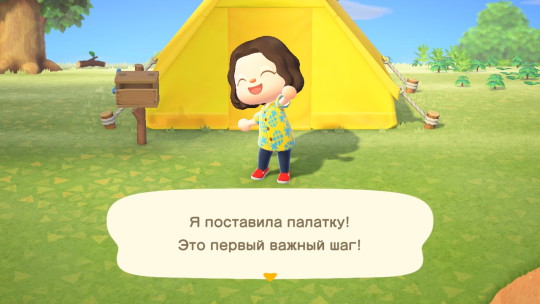
If you want to read something above your level, I recommend to use your smartphone and the Google Translate app to scan the text from the game (or book). As soon as the text is digitalized its much easier to look up words. I look up each unknown word and try to understand the sentence as best as I can. I save these texts from the game for later review. In most cases I ignore the translation from Google Translate, because I won't learn anything from relying on this translation. I learn the most if I look up unknown words and make an effort to understand the sentence myself. Only if I really can't make sense of a sentence I look at the translation for clarification.
#langblr#languagelearning#languageblr#self study#language learning#study russian#learning russian#russian novel#graded reader#animal crossing#Две встречи в Париже#Медовый месяц в Париже
4 notes
·
View notes
Text
February roundup - Russian
Years ago, I started learning Russian. I bought novels in Russian and a textbook. But this textbook wasn't really beginner-friendly. In every new lesson, the dialogue contained many new words but only few words from the previous lessons. The author probably wanted the learner to study the whole vocabulary list before going on but I didn't like this approach. After only a few lessons I felt too overwhelmed and decided to focus on Japanese instead.
On February 13th, I tried it again and now I'm much more optimistic. I gained more experience as a language learner through Japanese and can use that now with Russian. Plus, I discovered the Refold Russian server on discord which is a very helpful place for finding resources and guidance.
I want to reach a point at where I can understand the novels in Russian that are waiting on my shelf.
In this post I want to share what I did so far, which resources I used and my thoughts. I think I'll post one update every month.
(YouTube) Comprehensible Russian: Zero Beginner (watched: 38 of 75 videos)
Easy to understand even for absolute beginners. The first 10 or 15 videos are very easy with lots of repetition. After around 15 videos the complexity slowly increases.
Assimil (Lesson 1 - 10)
Compared to the textbook I used years ago, Assimil introduces the language in a much more beginner-friendly manner. I like it so far.
(Anki) Russian starter deck (this one)
This deck was recommended in the Refold Russian server on discord. It starts with simple sentences and contains lots of explanations. I did 10 new cards per day.
Short Stories in Russian for Beginners by Olly Richards (Story 1 - Story 3)
I looked up many words, but the stories are not too complicated. They introduce many common words and repeat them regularly in their stories, which helps to get used to them. I tried to listen to the audio book while reading but it’s too fast at my current level, so I focused on reading for now.
This book is aimed at beginners but I think it's difficult for complete beginners like me. Ideally, you are already familiar with basic vocabulary before reading this book. Otherwise, you have to look up almost every word (like me). However, after reading two stories, I noticed that recognizing and understanding words became a bit easier (in the beginning, all new words looked somewhat the same). It's hard if you start almost from zero like me, but it's possible and you'll make progress.
(YouTube) Different Let's Plays
I watched a few videos of Russian native speakers who are playing games I'm interested in. Like Animal Crossing or Метро: Исход. They are too difficult for now, but they are also motivating and make me want to keep going.
(YouTube) Easy Russian
Too difficult for now, but I really like their videos. They have subtitles in Russian and English, their topics are interesting and the people from Easy Russian do a great job.
(YouTube) Russian with Max
It’s too difficult at the moment but I like his vlog videos so far. He visits many different places and explains a lot and there are subtitles which is great. I started to look up words from one video.
(YouTube) Video about pronunciation from RussianPod 101 (this one)
I liked this video. It's well-structured and not too fast so that you can comfortably follow along.
...
These are the things I did in Russian in February! I feel like I already learned much more than during my previous attempt, but I'm still at the very beginning of course. I'll post another update at the end of the month.
#langblr#languagelearning#languageblr#self study#language learning#study russian#learning russian#russian language#language study
20 notes
·
View notes
Text
Short update
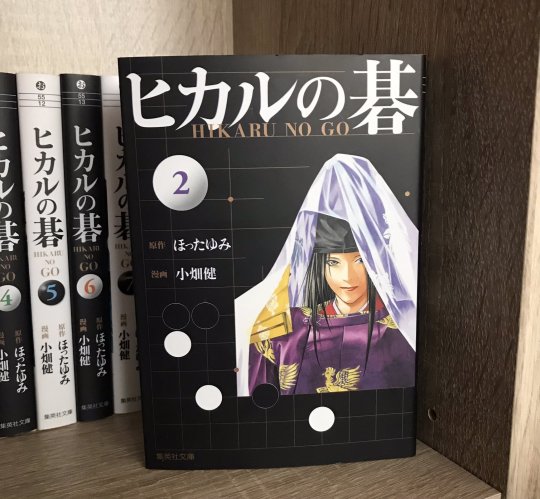
I finished volume 2 of ヒカルの碁. I really liked this volume and can't wait to read the next one. ^__^
I also finished the third chapter of 逆転裁判 2. I'm currently in the middle of chapter 4. This case is very dramatic and interesting!
And I just finished chapter 2 of 1Q84. Some paragraphs are difficult but I take my time.
I watched episode 13 of 名探偵コナン today. I absolutely love this series! I always read the japanese subtitles before watching a new episode and look up unknown words to improve my understanding. Then I watch the episode without any subtitles.
I already noticed a small improvement of my listening skills. I can hear the sentences more clearly and can understand them a bit faster than before. But it depends on the speaker. Conan and Ran for example are mostly fine, but Prof. Agasa and Megure are much more difficult to understand. They are mumbling a lot... ^^; But as long as I keep going, I'm sure I'll understand more and more over time.
(This is not my only source for listening practice, of course. It's just that when it comes to watching anime in Japanese, 名探偵コナン is my personal number one favorite.)
#langblr#languagelearning#languageblr#japanese learning#self study#learning japanese#language learning#study japanese#日本語勉強
5 notes
·
View notes
Text
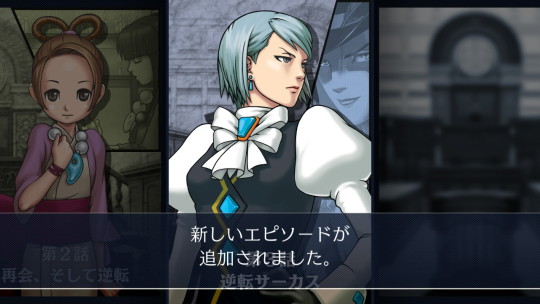
I just finished episode 2 of 逆転裁判 2! The end was quite sad and tragic... T__T
#langblr#languagelearning#languageblr#japanese learning#self study#learning japanese#language learning#study japanese#日本語勉強#visual novels#ace attorney#逆転裁判
6 notes
·
View notes
Text
1Q84 — Chapter 1
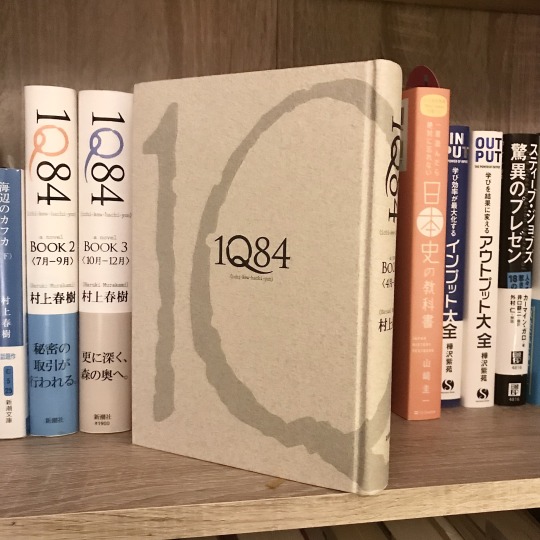
(I think the book looks very elegant without its cover ^__^)
Recently, I discovered the audio book version of 1Q84 on Audible and instantly bought it. Years ago, I've read this novel in German and loved it. 1Q84 fascinated me like no other novel before. I was captivated by the characters & story and turned page after page.
My original plan was to read another novel next (I thought it would be best to read single volume novels first), but now that I have even the audio book I changed my plan because I didn’t want to wait any longer.
My strategy
I just finished reading and listening the first chapter. I want to read this book more thoroughly, so I’m looking up more words than usual. Plus, after every paragraph I listened to the corresponding part of the audio book while following the words on the page and visualizing the scene in my mind. Now that I reached the end of the chapter, I’ll listen to it again, but now without looking at the text and without stopping after every paragraph.
Some paragraphs of the book are still difficult to understand so the audio book is even more challenging. But I feel that focusing on short sections first improves my understanding. I don't understand everything but I can still follow the story. Considering the difficulty of the book, this is not too bad at this stage. This is only chapter 1 and there are two more volumes. I try my best to improve my understanding over time.
About this chapter
I like how the first chapter introduces the main character. A young woman is sitting in a taxi which is stuck in a heavy traffic jam. The radio plays classical music. Nothing unusual. But from now on, the author gradually reveals more and more interesting details about the main character, the driver, the interior of the taxi, the music and so on. As the chapter progresses, it becomes clear that the main character is no ordinary woman. Many things are rather hints than concrete information. These hints will reveal their importance in later chapters. 1Q84 is a big puzzle. With every chapter, more and more pieces are falling into place. That’s what captivated me.
#langblr#languagelearning#languageblr#japanese learning#self study#learning japanese#language learning#study japanese#日本語勉強#japanese novel#haruki murakami 1q84#haruki murakami#1Q84#小説#村上春樹
9 notes
·
View notes
Text
I finished 『ひと』 !

Now that I've read the last chapter of 『ひと』 I want to share my thoughts:
Story
I have mixed feelings. Slice of life stories are nice and relaxing to read from time to time but, unfortunately, I struggled to motivate myself to continue reading. I can see the value of this kind of story, however, I missed interesting twists, unusual events, challenges that the main character needs to overcome, etc. (=anything that would make me curious) To be fair, it's not that the main character doesn't has any goals nor problems, far from it. But they are so … normal. I usually prefer interesting and exciting stories. Mystery, action, suspense, thriller… you name it. That's why slice of life is a bit boring for my taste.
However, this is just my personal taste and has nothing to do with the quality of the book itself! Although it was not a page turner for me, it's not that I dislike the story. I think it's a nice slice of life story.
The first chapter introduces the protagonist, his difficult life situation, his past and several other characters. The books reveals gradually more and more details about the protagonist and other characters in a natural way. I liked the pleasant writing style and storytelling.
To me, the story and characters felt very realistic. It was not like the dramatic, exciting and exaggerated stories I'm used to (and usually prefer). Reading this book rather feels like watching normal people like you and me living their normal life: You learn about their struggles, see how they are building relationships and how they are trying to find their way in life.
Most of the time I had the impression that the main character didn't know what to do with his life (I think many people can relate to that). He didn't have much confidence in himself and his abilities. In chapter 3, things changed a bit thanks to people around him. They encouraged him to believe in his abilities which opened new paths for him (I'm very vague here to avoid spoilers). I was curious which path the main character will choose.
During the last chapter, the protagonist made some surprising decisions. It seemed like he became a bit more confident and optimistic and finally realized what is important to him at this point in life. Especially the last page was a big surprise for me.
It's a bit sad, though. The end made me more curious what will happen next than the other chapters before.
Difficulty
The level of difficulty was okay. I had to look up many words and didn't understand every detail but most of the time I was able to follow the story. Only scenes with descriptions of different kinds of meals and other cooking and work related things were quite difficult because of my lack of vocabulary in these areas.
I think this novel is a bit difficult but not too hard to read. Compared to other novels, most sentences are surprisingly short. So even though there were words I didn't know the sentences were not very complicated.
I was able to follow the story but I felt that I missed lots of nuances that are important to really understand the appeal of the story. At this point, I've read two or three books where I had the same feeling. In other books, this doesn't matter too much. Understanding what is happening is usually enough to enjoy the book. But there are books where I have this vague feeling that following the story itself is not enough. That's why reading these books felt ... unsatisfying. I'm not sure how to describe it. Did you experience something similar?
Anyway, I still have a lot to learn. And since I'm not a big fan of slice of life stories, please take my thoughts with a grain of salt. I just described how I personally experienced reading the book at my current level. This genre may not be my cup of tea but I think it's a nice story that makes you think about life.
#langblr#languagelearning#languageblr#japanese learning#self study#learning japanese#language learning#study japanese#日本語勉強#ひと#小説#japanese novel
14 notes
·
View notes
Text
My advice on Remembering the Kanji (RTK)
Before I share my learning routine and advice for RTK I would like to write about my personal experience first:
When I started to learn Japanese, kanji seemed incredibly difficult. They were just a complicated combination of strokes to me. Then I came across the book Remembering the Kanji (RTK) by James W. Heisig. Volume 1 presents a total of 2.200 kanji (including most of the Jōyō kanji).

I used the german version of Remembering the Kanji
The beginning was promising. I easily learned the first few hundred kanji. This experience was amazing. I never thought that this could be possible. But then I made the mistake of proceeding too fast. I saw forum posts of other RTK users who claimed that they “finished“ RTK in 3 months or even less. This motivated me and I tried to learn 25 kanji a day. Even though it was difficult to create memorable stories for this amount of kanji every day I moved on. After my first try to learn kanji with RTK, I forgot a great part of it after I “finished” the book.
I was not satisfied but I decided to move on and tried to read as much as possible instead. My idea was that I would make faster progress if I don’t learn kanji consciously. It’s not impossible to learn some kanji by seeing them repeatedly in context but it didn’t worked as well as I expected.
Kanji seemed not as complicated like before but because of the great number of kanji and a lot of similar looking kanji they were still a great obstacle for me. Then I noticed that I still remembered the meaning of a number of kanji I learned with RTK. When I came across these kanji in context, I was able to understand new words without looking them up. Knowing their (rough) meaning really made a big difference. This made me think.
Around this time, I gave RTK a second chance and learned from my mistakes. I realized that if I really wanted to benefit from RTK I need to think long-term. It’s not that you do RTK for only 3 months and you are done. What I needed were sustainable strategies.
I finished all 2.200 kanji (RTK volume 1) a while ago and I know most of them well now. By reviewing my RTK deck my recognition rate will further improve over time. My RTK knowledge helps me enormously with reading japanese books. I’m really happy that I gave it a second chance. That’s why I want to share my experiences and tips in this blog post. I hope that this post can be helpful for Japanese learners who struggled with RTK.
My learning routine
My usual learning routine looked like this (more detailed tips below):
1. Review
Every day, I used Anki to review my own RTK deck.
Read the keyword and (if in doubt) the hint
Try to remember the elements of the kanji and their positions and write the kanji in the air
Turn the card and check the kanji
If it was wrong, change the hint and/or improve the story
2. Adding new kanji
After reviewing I usually added around 10 to 15 new kanji a day. My cards contain not only keyword and kanji but also fields for hints, elements of the kanji and the story. Here’s an example (my original cards are in German so this is just a rough translation):
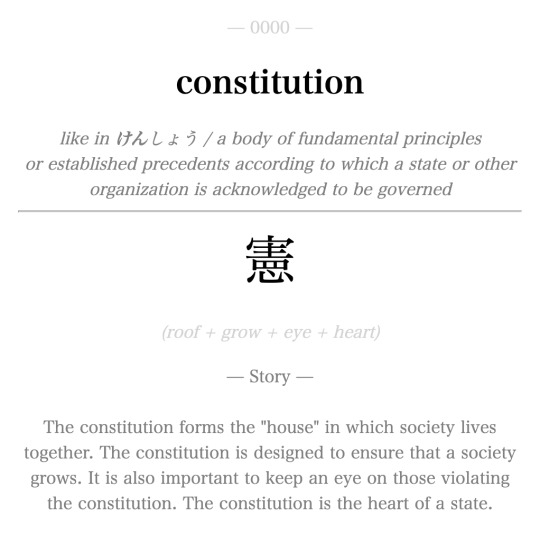
Hints: If the keyword was very similar to another kanji I added a hint to reduce the risk of mixing them up.
Elements: I also added the elements of the kanji. This is useful for two reasons: By writing them out I become more aware of the elements which helps to remember new or complex elements correctly. Plus, by putting them on the back side of the card I can refresh my memory during reviews without using the book.
Story: Instead of creating a story only in my head I added the story to my cards. The reasons are the same like for the elements (see above).
…
After adding 5 new kanji I made a small break, came back and reviewed the new kanji. Then I repeated this process for another 5 kanji.
I usually added around 10 to 15 kanji a day. This was my sweet spot. Since I work full time and because my main focus was on reading japanese books I hadn’t a lot of time for RTK. By not adding more kanji that I can handle I made sure that I remember them well.
Then I continued reading a book in Japanese and/or listened to something in Japanese. RTK was just a small part of my learning routine. My goal was not to finish it as fast as possible but to make sure that I remember these kanji as well as possible. Slowly but steady I learned more and more kanji. This gave me a noticeable advantage while reading.
RTK is not a race
As I wrote above, I made several mistakes myself but instead of blaming RTK I realized that I need to take the explanations in the book more seriously. It’s really important to make sure that the stories are memorable and that you pay attention to the details.
The most important lesson I learned was that RTK is not a race. During my second attempt, it was not my goal to “finish” RTK as fast as possible but to remember these kanji LONG-TERM because this makes reading and learning new words much easier.
By proceeding too fast, the risk of forgetting a lot of kanji is very high. When it comes to RTK, a high recognition rate is more important than speed, in my opinion. That’s why I created sustainable strategies that helped me to remember most of the 2.200 kanji long-term.
5 Tips on Remembering the Kanji
Tip #1: Don’t underestimate the power of writing
In the beginning, I used to write every kanji on paper. Now, I only write them with my finger (either in the air or on the table). This is much faster and easier.
Why writing them at all? Some people say, being able to recognize them is enough. Personally, I remember them much better through writing (even if I just write them in the air; the movement of the hand makes a great difference for me). In my experience, writing works much better than just looking at a kanji because through writing I become aware of every detail. Many kanji look pretty similar. Sometimes only one little detail is different. The risk of mixing them up is much higher.
I tried the “recognition-only approach” in the past and it didn’t work well for me. The ability to recognize and distinguish kanji just by looking at them has its limits. It’s not very accurate, that’s why I still mixed up similar kanji. 宇 and 字 or 烏 and 鳥 for example look very similar at the first glance. The original RTK method on the other hand helps to avoid that because you pay much more attention to the details.
Plus, writing in Japanese by hand is important to me. I love writing and kanji are very beautiful! That’s the reason why I want to be able to write in Japanese. But even if you don’t want to be able to write kanji, I recommend to write them in the air during reviews to reduce the risk of mixing them up. It may not seem like this could make a big difference but in my experience it’s really helpful. The power of writing should not be underestimated.
Tip #2: Add hints
When I repeatedly mix up kanji or when I can’t remember how to write them correctly, it’s a sign that the story is weak. I pay attention to the story and try to make it more memorable. Plus, when I confuse a kanji with another I add a hint to the card like “Don’t confuse with [similar keyword]”.
It’s also helpful to copy the definition of the keyword from a dictionary and/or a japanese word written in hiragana that contains this kanji and add it to the card. This way I have more context and this prevents me from confusing a keyword with a similar one (because the definitions are different).
Using little hints is a great way to make the learning process less frustrating. Over time, I need these hints less and less. Eventually, I remember difficult kanji correctly.
Tip #3: Take the time you need
It’s also very important not to rush. I barely added more than 15 new kanji a day. Most of the time, I only added about 5 or 10 a day. Since I work full time and because my main focus was on reading japanese books I hadn’t a lot of time for RTK.
During reviews I pay attention to the things I described above. Do I mix them up? Can I remember them correctly? Whenever I have trouble to remember certain kanji, I improve the story and/or add some hints. Some kanji may be more difficult than others, but over time you can learn every kanji by paying more attention to them. Paying attention to why you didn’t remember some kanji correctly and eliminating sources of error is really important. If a story doesn’t work don’t hesitate to improve it.
However, there’s no need to be too strict. You don’t need to nail them down to 100% before you move on. But I think it’s a good idea to give new kanji time to sink in a bit before continuing. That’s why I recommend to slow down the pace instead of rushing through the book.
Tip #4: Be creative
The meaning of some primitives chosen by Heisig are not optimal for everyone. It works much better if you choose something that has a strong meaning to you (like, characters from your favorite series). Just make sure that your personal meaning doesn’t conflict with later keywords or elements. Ideally, it’s as close to Heisig’s word as possible or it’s so unique that it’s impossible to mix it up with other words.
If a kanji is used as part of another kanji (like 青 in 請 for example) you don’t necessarily need to use it in it’s combined form if it’s difficult to create a good story. You can split or combine the elements of a kanji the way you like if it helps you to remember the kanji.
Tip #5: Combine RTK with reading
Some people recommend beginners to do RTK at the very beginning of their Japanese learning journey. The idea is, to complete RTK as fast as possible so that you can focus 100% on the language itself afterwards. However, I think depending on the person this can be counterproductive. RTK is probably more difficult for people who just started with Japanese because they can’t see the benefits of RTK yet. When you have no use for what you are learning it’s hard to stay motivated over an extended period of time. I think this is one reason, why people who tried RTK gave up.
When I started RTK I wasn’t a complete beginner of Japanese. I did RTK in addition to my other Japanese activities like reading books. This way, I often came across kanji I just learned. I saw them in context and they helped me to understand new words without looking them up. Experiences like these were a strong proof for me that RTK really pays off and this gave me a motivation boost.
So instead of doing RTK at the beginning and doing nothing else, I recommend to wait until you can read at least graded readers or easier novels, for example. Otherwise it’s probably too hard to stay motivated for so long.
…
I hope these tips can be helpful for someone. It’s sad when I read that some people gave up because they constantly mix up or forget a lot of kanji. There are also people who rush through RTK without creating memorable stories for each kanji and stop doing their reviews after “finishing” RTK. And then they claim that RTK is a waste of time and doesn’t work because they can’t remember most of the kanji — which is no surprise in this case.
While I absolutely understand that RTK may not work for everyone it’s not fair that people who didn’t take the explanations in the book seriously claim that it doesn’t work in general.
Learning kanji takes time. This is absolutely normal. It’s not a shame if you need more than 3 months or a year to complete RTK. In my opinion, if the goal is to remember these kanji long-term 3 months are very unrealistic for most people. Seeing people who “finished” RTK in a short amount of time creates false expectations. RTK is not about breaking records. To me, it’s much more important to make sure that you remember these kanji long-term. Every learned kanji is already a little advantage, that’s why speed is not so important anyway.
Without RTK learning kanji would have been much more time consuming and frustrating for me and the risk of forgetting and mixing them up would be much much higher. To me, there’s no real alternative to RTK and now that I finished it I’m very happy that I put in the work and time.
Maybe I will also learn the additional 800 kanji from volume 3 in the future. But for now I’ll focus on consolidating the 2.200 kanji from volume 1 and on other learning activities.
#langblr#languagelearning#self study#japanese learning#languageblr#learning japanese#language learning tips#remembering the kanji#kanji#learning kanji
90 notes
·
View notes
Text
Update chapter 3:
This chapter was a bit more interesting. The main character learns more about his parents, especially about his father's working life. As far as I understood it, the main character is thinking about following the same path. And then there is also his old hobby, his passion. There are people who encourage him to give it another chance.
Until now, I had the impression that the main character didn't know what to do with his life. He didn't had much confidence in himself and his abilities. It looks like things changed a bit thanks to the people around him. I'm curious which path the main character will choose.
Only one more chapter!
My first impressions of 『ひと』

I've read the first chapter and would like to share a few thoughts in this post.
The first chapter introduces the protagonist, his difficult life situation, his past and several other characters. Apart from that, there are no special or dramatic events in this chapter. At this point, I'm not sure what this story is about or what to expect. I think this will change with the next chapter.
I like how the story is told. It starts with the focus on the protagonist and introduces gradually more and more details about the protagonist and other characters in a natural way. It’s quite pleasant to read so far. Although nothing special happened during this chapter, I never felt bored. It's interesting to learn more and more about the protagonist and I'm curious how his life will change in the next chapters.
The level of difficulty is okay. I have to look up a bunch of words and don't understand every detail but most of the time I can follow the story well. Only scenes with descriptions of different kinds of meals and other cooking and work related things are quite difficult because of my lack of vocabulary in these areas. I have to google most of the described meals because I don't know them.
Apart from that, I think this novel is not too hard to read so far. Compared to other novels, most sentences are surprisingly short. So even though there are words I don't know the sentences are not very complicated. This is a good balance.
These are my thoughts so far. I'm curious how the story will develop.
#langblr#languagelearning#languageblr#japanese learning#self study#learning japanese#language learning#study japanese#日本語勉強#japanese novel#小説#ひと
16 notes
·
View notes
Text
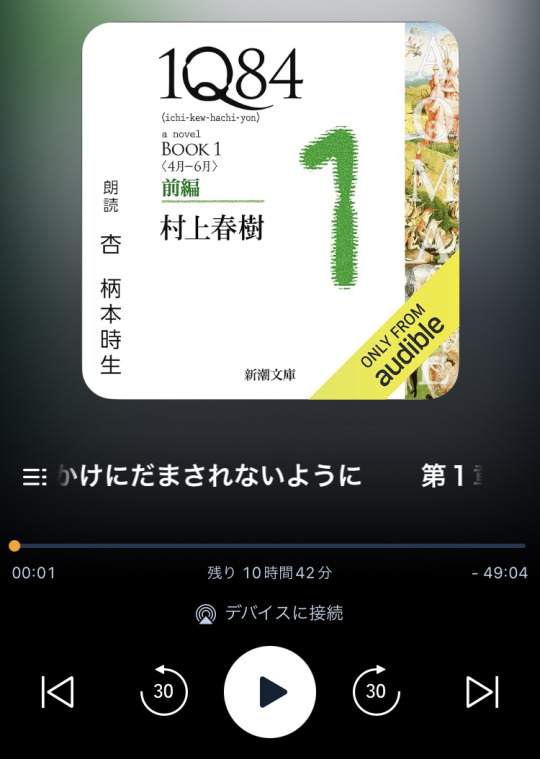
I'm currently reading ひと and the fifth volume of ハリー・ポッター. I wanted to read other novels next, but now that I discovered the audio book of 1Q84 on Audible I think I'll change my plans a bit.
Years ago, I've read the first two volumes in German and loved it (they published it in one single book so at that time I didn't know that one volume is "missing" XD). 1Q84 fascinated me like no other novel before. I turned page after page.
The japanese version is probably quite challenging at my current level (that's why I wanted to read other novels first). But now that I have the opportunity to also familiarize myself with the audio book I don't want to wait much longer. Right after finishing ひと I'll start with 1Q84. I'm so excited!
#langblr#languagelearning#languageblr#japanese learning#self study#learning japanese#language learning#study japanese#日本語勉強#1q84#haruki murakami 1q84#haruki murakami#japanese novel#小説#japanese books#reading in japanese#audio book
3 notes
·
View notes
Text
ヒカルの碁 volume 1
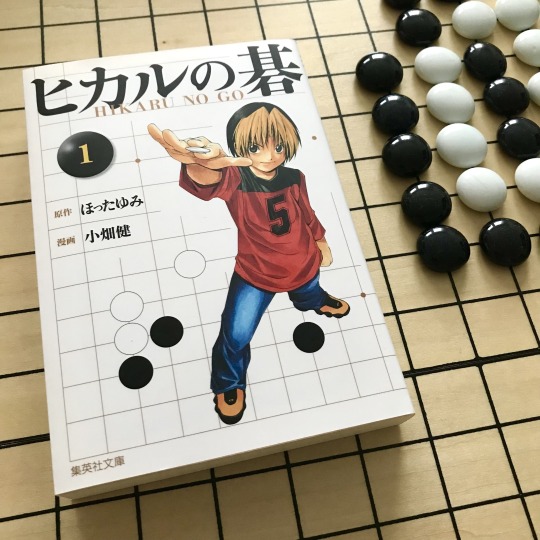
I finished volume 1 of ヒカルの碁!A long time ago, I've read the first 4 or 5 volumes in German. I was fascinated by the story and the board game Go. (I even bought a Go set and played a bit) Somehow I never bought the other volumes … which I later regretted… T^T Now, many years later, reading this manga in Japanese is a very special experience to me.
(Very light) spoiler warning: In the following, I want to highlight some aspects of the story and characters. I tried to be as vague as possible to avoid clear spoilers. I didn’t describe specific events but just in case you definitely don’t want to know anything before you read the manga yourself you probably should not read the following text.
The manga is quite old, but the drawings are still excellent in my opinion. I like, how the main character Hikaru slowly changes his opinion about the board game Go (it's usually not very popular among young people; or at least not among Hikaru's peers). In the beginning, he is a bit arrogant and selfish boy (in a childish way). Some of his remarks are quite rude. He’s not really a mean character, but he often speaks without thinking (like many boys this age). That’s why he unintentionally offends people or hurts their feelings. But he gradually learns from his mistakes and becomes a bit more compassionate. Or in other words, he matures over time.
Another character I really like is Hikaru’s rival, Akira. He is quite the exact opposite of Hikaru: very polite, friendly, well mannered, privileged and — most importantly — an extremely good Go player. This is no coincidence since his father is a professional Go player who earned several titles and who taught Akira from a very young age. The manga shows his perspective aka what it means to be perceived as a "genius“. From the outside, it seems like a good thing: All the praise and attention. But there is also rumors, envy, hate, loneliness, …
I really like that the story also shows his perspective because this is something that is often overlooked in real life. Someone who reached a high level in a certain area is often called "talented“ or "genius“ but people don’t see that these "geniuses“ had to work very hard (often from a very young age) to get that good. They’ve spent a great amount of time practicing and had to sacrifice other things. Their childhood was very different compared to other kids. Plus, just because they are perceived as talented because of their skill doesn’t mean they live a perfect happy life without any problems. They are humans with feelings and faults like everyone else, after all.
(Possible spoilers end)
Another thing I like about the manga is, that it shows the beauty of Go and conveys the passion of the people who play this game. It's really impressive, how a good manga can spark interest for something you didn't even know that it exist. (In Germany, I think everyone knows what chess is but people who heard about Go are rare.)
I expected this manga to be difficult to understand because of the Go related vocabulary and the game rules. Now that I’ve read volume 1, I can say that it is a bit difficult but once I got used to the most important words, overall this volume was not as difficult as I expected. This is only the beginning, of course. I vaguely remember parts of later volumes that will probably be more difficult to understand because of the complexity of the story.
#langblr#languagelearning#languageblr#japanese learning#self study#learning japanese#language learning#study japanese#日本語勉強#japanese manga#ヒカルの碁
12 notes
·
View notes
Text
Update: I finished chapter 2 (of 4), which means I've read half of the book so far. To be honest, I have very mixed feelings.
Although I need to look up quite a lot of words, this book makes me feel relaxed. To me, the story and characters feel very realistic. It's not like the dramatic, exciting and exaggerated stories I'm used to (and usually prefer). Reading this book rather feels like watching normal people like you and me living their normal life: You learn about their struggles, see how they are building relationships and how they are trying to find their way in life.
On the other hand, I have to admit that I struggle to motivate myself to continue reading. I can see the value of this kind of story (as I wrote above), however, after reading half of the book I'm missing interesting twists, unusual events, challenges that the main character needs to overcome, etc. (=anything that would make me curious) To be fair, it's not that the main character doesn't has any goals nor problems, far from it. But they are so … normal. Unfortunately, these kind of stories are not a pageturner for me.
It's also possible that I missed lots of nuances that are important to really understand the appeal of the story. I have still a lot to learn, after all. So please take my impressions with a grain of salt.
At least the title of the last chapter makes me curious. I really want to give the book a chance to surprise me and I try my best to stay positive and open-minded. Maybe after the last chapter, I'll think different about the book.
My first impressions of 『ひと』

I've read the first chapter and would like to share a few thoughts in this post.
The first chapter introduces the protagonist, his difficult life situation, his past and several other characters. Apart from that, there are no special or dramatic events in this chapter. At this point, I'm not sure what this story is about or what to expect. I think this will change with the next chapter.
I like how the story is told. It starts with the focus on the protagonist and introduces gradually more and more details about the protagonist and other characters in a natural way. It’s quite pleasant to read so far. Although nothing special happened during this chapter, I never felt bored. It's interesting to learn more and more about the protagonist and I'm curious how his life will change in the next chapters.
The level of difficulty is okay. I have to look up a bunch of words and don't understand every detail but most of the time I can follow the story well. Only scenes with descriptions of different kinds of meals and other cooking and work related things are quite difficult because of my lack of vocabulary in these areas. I have to google most of the described meals because I don't know them.
Apart from that, I think this novel is not too hard to read so far. Compared to other novels, most sentences are surprisingly short. So even though there are words I don't know the sentences are not very complicated. This is a good balance.
These are my thoughts so far. I'm curious how the story will develop.
#langblr#languagelearning#languageblr#japanese learning#self study#learning japanese#language learning#study japanese#日本語勉強#japanese novel#小説#ひと
16 notes
·
View notes
Text
Visual Novels
When it comes to visual novels in Japanese, years ago I played ダンガンロンパ 1 + 2 and I'm currently playing 逆転裁判. I also tried Steins;Gate, although I didn't come very far because of the level of difficulty. I'll try it again with a bigger vocabulary.
I would like to try more VNs but I'm overwhelmed by the great amount. Plus, by scrolling through the Steam shop many VNs seem to be NSFW or Boys Love and stuff like that (I'm absolutely not the target audience, to be honest XD).
This makes it hard for me to find something that could be interesting to me. I usually like detective or mystery stories but slice of life is ok, too. Interesting characters and a good story are very important to me.
If you can recommend some japanese visual novels please let me know!
#langblr#languagelearning#languageblr#japanese learning#learning japanese#language learning#study japanese#日本語勉強#visual novels#japanese video games#japanese visual novel#visual novel
21 notes
·
View notes
Text
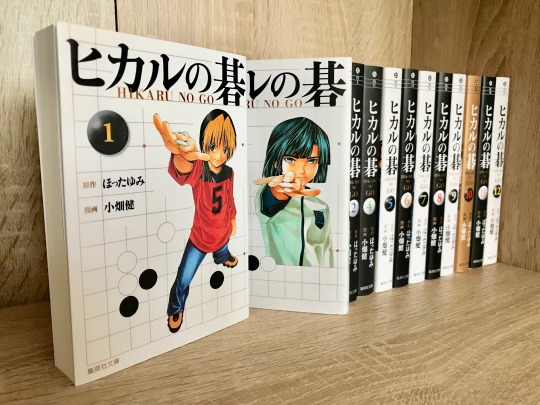
They arrived! :D
A long time ago, I've read the first 4 or 5 volumes in German. I was fascinated by the story and the board game Go. Later I regretted that I never bought the other volumes. :/
This manga still had a special place in my heart so I tried to get it in Japanese. Since this series is quite old, I was surprised that it is still available. Can't wait to read it in Japanese to finally follow Hikaru's journey to the end! ^__^
I think this manga is probably a bit difficult to read because of the Go related vocab. I'll see.
#hikaru no go#langblr#languagelearning#languageblr#japanese learning#self study#learning japanese#language learning#study japanese#日本語勉強#japanese manga#ヒカルの碁
40 notes
·
View notes
Text
My first impressions of 『ひと』

I've read the first chapter and would like to share a few thoughts in this post.
The first chapter introduces the protagonist, his difficult life situation, his past and several other characters. Apart from that, there are no special or dramatic events in this chapter. At this point, I'm not sure what this story is about or what to expect. I think this will change with the next chapter.
I like how the story is told. It starts with the focus on the protagonist and introduces gradually more and more details about the protagonist and other characters in a natural way. It’s quite pleasant to read so far. Although nothing special happened during this chapter, I never felt bored. It's interesting to learn more and more about the protagonist and I'm curious how his life will change in the next chapters.
The level of difficulty is okay. I have to look up a bunch of words and don't understand every detail but most of the time I can follow the story well. Only scenes with descriptions of different kinds of meals and other cooking and work related things are quite difficult because of my lack of vocabulary in these areas. I have to google most of the described meals because I don't know them.
Apart from that, I think this novel is not too hard to read so far. Compared to other novels, most sentences are surprisingly short. So even though there are words I don't know the sentences are not very complicated. This is a good balance.
These are my thoughts so far. I'm curious how the story will develop.
#langblr#languagelearning#languageblr#japanese learning#self study#learning japanese#language learning#study japanese#日本語勉強#japanese novel#小説#ひと
16 notes
·
View notes
Text
InnerFrench (podcast recommendation)
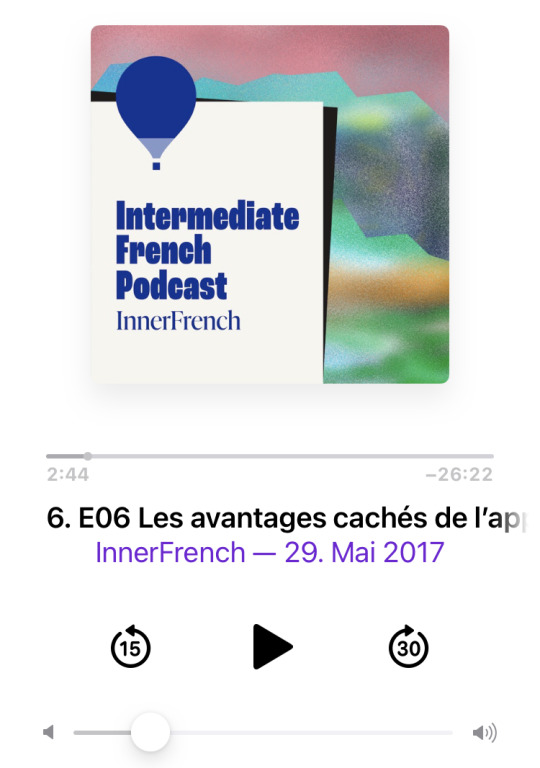
Today I want to recommend a podcast aimed at people who are learning French: InnerFrench. I’m currently using this podcast to improve my listening skills.
InnerFrench is perfect for you if beginner content is too easy (and boring) but native content is still very difficult (like in my case).
In every episode, Hugo talks about a different topic. He speaks a bit slow compared to content aimed at native speakers but I think it’s not unnaturally slow, like, beginner content. Rather like a native speaker who talks in a very relaxed manner. It’s very pleasant to listen to.
I haven’t listened to every episode, yet, but in later episodes, you can also listen to conversations between Hugo and Ingrid, for example. Which is great because it’s important to not only listen to monologues but also how native speakers are talking to each other.
Each episode is around 30 minutes long. Hugo talks about a great variety of topics which makes this podcast very interesting (in my opinion). Plus, he often describes words that could be difficult for language learners with easier words. I think these "definitions“ are great. Not only because it helps you to understand but you also learn how you can describe words you don’t know. This is a very useful skill in conversations.
Some episodes are more difficult than others (depending on the topic and used vocabulary). Fortunately, you can find transcripts on the InnerFrench website (you just need to create a free account). This is extremely helpful!
As I said before, I can’t speak for all episodes but I really like this podcast so far.
#langblr#languagelearning#languageblr#self study#French#learning french#language learning#study french#podcast#french podcast#InnerFrench
11 notes
·
View notes
Text
わたし、定時(ていじ)で帰ります
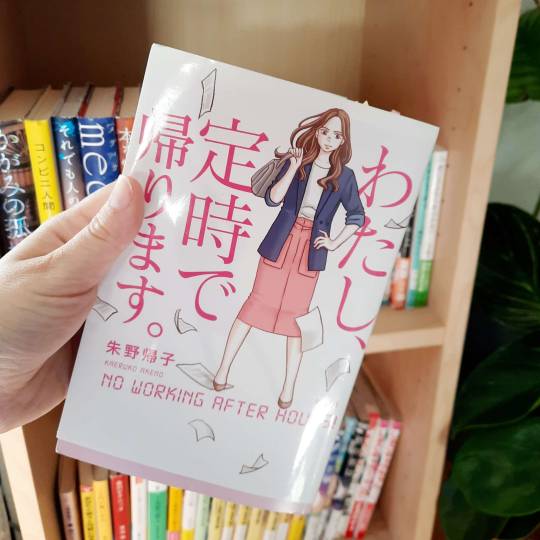
For the month of October I'm reading the novel わたし、定時で帰ります by Akeno Kaeruko. The main character is Higashiyama Yui and it's her golden rule that she goes home on time! No over time. However she works at a company with very questionable executions of the labor laws and her coworkers seem even excited about giving all their life to this company.
I'm a bit more than 50 pages into the book and love the dark humour. The characters still seem a bit like caricatures at this point, but the main character's strugles to reconcile her own beliefs and her work reality make for a very entertaining read.
I'm familiar with most of the work related vocabulary and also appreciate the fact that Yui's story is mostly told through dialogue between the coworkers. I'm making good progress but in line with the spirit of the book, I'm only able to read it whenever I can make time for it during my lunch break and after I've gone home ^^
97 notes
·
View notes
Text
【日本語の練習】 ウィーン旅行
I tried to write about my summer trip to Vienna in Japanese. My Japanese writing skills need a lot of practice but I hope you understand what I wrote (despite the mistakes ^^;).
8月22日
私は早く起きました。スーツケースを持ってバス・ステーションへ行きました。バス・ステーションからコーチバスでウィーンに行きました。午後5時ごろホテルに着きました。チェックインした後、レストランで夕食を食べました。とても暑い日でした。(--_--)

8月23日
私はウィーンの名所を見物したり、写真を撮ったりしました。それから自然史博物館に行きました。とても面白かったです。博物館のレストランで昼食を食べました。ホテルに帰った後、リラックスしました。(─‿─)

8月24日
私はシェーンブルン宮殿の動物園に行きました。ゾウやペンギンやコアラを見ました。とても楽しかったです。(^▽^)

8月25日
私は美術史美術館で展示されている古代エジプト遺物を見ました。とても素晴らしかったです。古代エジプトが大好きです。(^▽^)
きれいなバステト像も買いました。バステトは私が一番好きな古代エジプトの女神です。♡


8月26日
私はウィーンから帰りました。
#langblr#languagelearning#japanese learning#languageblr#self study#learning japanese#language learning#study japanese#日本語勉強#日本語練習#練習
24 notes
·
View notes